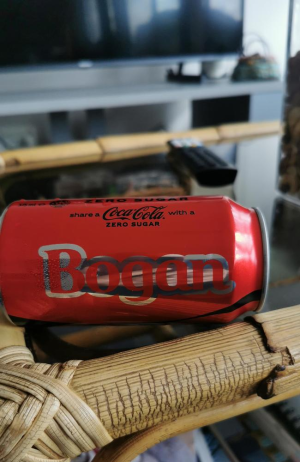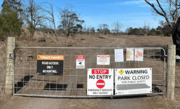Great Aussie debate returns as iconic brand revives classic campaign
By
Gian T
- Replies 0
Ah, the unique charm of local language—a rich mix of sayings and slang that can amuse some and ruffle feathers for others.
And what better way to reignite the conversation than with a fresh twist from a major global brand?
A well-known marketing campaign has returned, once again sparking chatter and controversy by featuring a phrase deeply rooted in everyday Aussie culture.
Let me catch you up for those who've been living under a rock (or perhaps prefer a cuppa over a fizzy drink).
Coca-Cola's 'Share A Coke' initiative first fizzed onto the scene in Australia back in 2011, and it was a hit.
The idea was simple: replace the iconic Coca-Cola logo with common names, encouraging people to find a can or bottle with their name on it or gift one to a friend.
It was personal, it was fun, and it was a marketing masterstroke.
Fast forward to now, and the campaign has returned, with almost 200 names and nicknames gracing the labels of Coca-Cola, Diet Coke, and Coke Zero Sugar.
But it's not just names that are getting the print treatment; a few quintessentially Aussie phrases have also made the cut.
'Boofhead', 'Sis', and 'Old Mate' are among the mix, but the inclusion of one term in particular gets people talking: 'Bogan'.
For the uninitiated, 'bogan' has bounced around the Australian vernacular since the 1980s.
Originating from the western suburbs of Melbourne, it's a word used to describe someone with a working-class background, often with connotations of being unrefined or unsophisticated.
It's a term as layered as an onion, sometimes worn as a badge of honour and other times slung as an insult.
So when a photo of a Coke Zero can emblazoned with 'Bogan' popped up on social media, it was like a can of worms had been cracked open.
Australians from all walks of life jumped into the fray to debate whether 'bogan' is a term of endearment or a derogatory slur.
Some social media users shrugged off the controversy, suggesting that any word could be considered a slur if you wanted it to be.
Others pointed out that 'bogan' is often self-proclaimed with pride, while a few cautioned against using the term unless someone had explicitly embraced it for themselves.
The conversation even spilled into academia, with historian Henry Paternoster weighing in a few years back.
'We don’t really use the term working class anymore so when we talk about class we now use words like ‘bogan’,' he noted.
'I think one of the really interesting things about this word is that ‘bogan’ can be used depending on whether you want to celebrate bogans or you want to denigrate them, it becomes this stereotype used to bash Australian or to elevate some aspect what you think Australian culture is.'
Coca-Cola, for their part, has taken a swig of the debate and declared their stance.
A spokesperson for the company assured that the 'Share A Coke' campaign is all about fun and inclusivity.
'We think ‘Bogan’ is a classic Aussie term usually used in good nature,' the spokesperson said.
'In fact, from our research, we believe there are some Aussies that are very proud to be called Bogan.'
So, where does that leave us, the over-60s who've seen terms come and go, who've watched Australian culture shift and change like the sands on Bondi Beach?
But let's not forget the heart of the matter—the 'Share A Coke' campaign is about connection, about finding a little piece of ourselves or our loved ones on a supermarket shelf and sharing a smile.
Whether you're a 'Boofhead', a 'Sis', an 'Old Mate', or even a proud 'Bogan', there's something undeniably Australian about finding the humour and camaraderie in a nickname.
 What's your take on the 'bogan' debate? Is it a term you wear with pride, or do you think it's best left in the past? And has Coca-Cola hit the mark with their latest campaign, or have they missed the cultural memo? Share your thoughts and stories in the comments below
What's your take on the 'bogan' debate? Is it a term you wear with pride, or do you think it's best left in the past? And has Coca-Cola hit the mark with their latest campaign, or have they missed the cultural memo? Share your thoughts and stories in the comments below
And what better way to reignite the conversation than with a fresh twist from a major global brand?
A well-known marketing campaign has returned, once again sparking chatter and controversy by featuring a phrase deeply rooted in everyday Aussie culture.
Let me catch you up for those who've been living under a rock (or perhaps prefer a cuppa over a fizzy drink).
Coca-Cola's 'Share A Coke' initiative first fizzed onto the scene in Australia back in 2011, and it was a hit.
The idea was simple: replace the iconic Coca-Cola logo with common names, encouraging people to find a can or bottle with their name on it or gift one to a friend.
It was personal, it was fun, and it was a marketing masterstroke.
Fast forward to now, and the campaign has returned, with almost 200 names and nicknames gracing the labels of Coca-Cola, Diet Coke, and Coke Zero Sugar.
But it's not just names that are getting the print treatment; a few quintessentially Aussie phrases have also made the cut.
'Boofhead', 'Sis', and 'Old Mate' are among the mix, but the inclusion of one term in particular gets people talking: 'Bogan'.
For the uninitiated, 'bogan' has bounced around the Australian vernacular since the 1980s.
Originating from the western suburbs of Melbourne, it's a word used to describe someone with a working-class background, often with connotations of being unrefined or unsophisticated.
It's a term as layered as an onion, sometimes worn as a badge of honour and other times slung as an insult.
So when a photo of a Coke Zero can emblazoned with 'Bogan' popped up on social media, it was like a can of worms had been cracked open.
Australians from all walks of life jumped into the fray to debate whether 'bogan' is a term of endearment or a derogatory slur.
Some social media users shrugged off the controversy, suggesting that any word could be considered a slur if you wanted it to be.
Others pointed out that 'bogan' is often self-proclaimed with pride, while a few cautioned against using the term unless someone had explicitly embraced it for themselves.
The conversation even spilled into academia, with historian Henry Paternoster weighing in a few years back.
'We don’t really use the term working class anymore so when we talk about class we now use words like ‘bogan’,' he noted.
'I think one of the really interesting things about this word is that ‘bogan’ can be used depending on whether you want to celebrate bogans or you want to denigrate them, it becomes this stereotype used to bash Australian or to elevate some aspect what you think Australian culture is.'
Coca-Cola, for their part, has taken a swig of the debate and declared their stance.
A spokesperson for the company assured that the 'Share A Coke' campaign is all about fun and inclusivity.
'We think ‘Bogan’ is a classic Aussie term usually used in good nature,' the spokesperson said.
'In fact, from our research, we believe there are some Aussies that are very proud to be called Bogan.'
So, where does that leave us, the over-60s who've seen terms come and go, who've watched Australian culture shift and change like the sands on Bondi Beach?
Well, it leaves us with a choice: to embrace 'bogan' as part of our cultural tapestry or to leave it on the shelf.But let's not forget the heart of the matter—the 'Share A Coke' campaign is about connection, about finding a little piece of ourselves or our loved ones on a supermarket shelf and sharing a smile.
Whether you're a 'Boofhead', a 'Sis', an 'Old Mate', or even a proud 'Bogan', there's something undeniably Australian about finding the humour and camaraderie in a nickname.
Key Takeaways
- Coca-Cola's Share A Coke campaign has returned, featuring almost 200 names and nicknames, including very Australian phrases.
- The inclusion of the word 'Bogan' on Coke cans and bottles has sparked debate over whether it's a derogatory term or a term of endearment among Australians.
- Opinions on social media vary, with some seeing 'Bogan' as a slur and others embracing it as a proud aspect of their identity.
- A Coca-Cola spokesperson said the campaign aims to be fun and inclusive, and they believe 'Bogan' is a term often used in good nature, with some Australians proud to identify with it.








